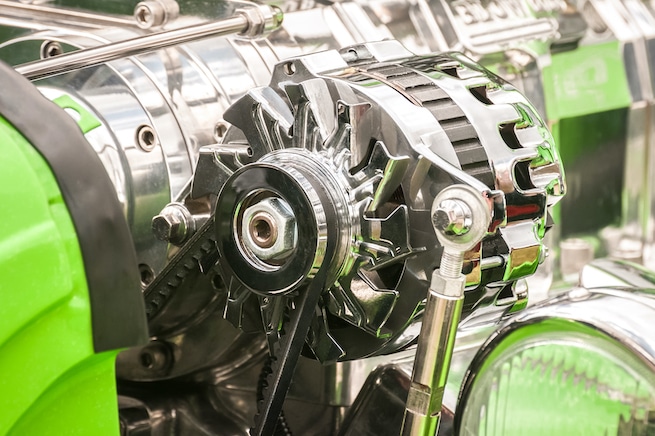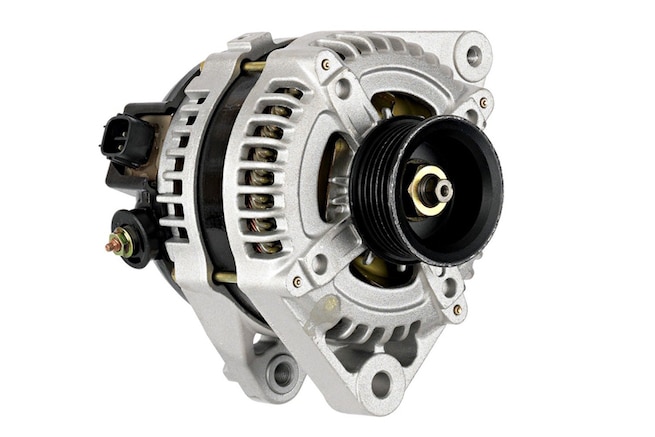How Long Does An Alternator Last? [Average Alternator Lifespan]
The alternator in your car produces all of the electricity needed for your car to operate as well as electricity for all of the accessories that came with the vehicle or aftermarket devices added by the owner.
An alternator produces an alternating current, which is converted to direct current(DC) to charge the battery and run everything. So, how long does an alternator last?
Car alternators can last from 40,000 miles to over a quarter of a million miles. At 20,000 miles a year, this translates to 2 years to 10 years and more. Their life span depends on how hard they have to work, overheating, as well as manufacturing processes.
When an alternator begins to fail, all of your electrical components begin drawing electrical energy from the battery, which causes it to lose its charge and eventually fully discharge. Your engine may just stop running.
Car technologies have evolved. The alternator provides power for the ignition system, all sensors, and the ECM, electronic control module, seat warmers, electric fans, radio, GPS, lights as well as devices that are connected via the cigarette lighter and USB ports in modern vehicles.
What causes an alternator to fail?
The alternating current flows through the rectifier assembly and is converted to DC by six diodes. Higher current draws by normal operation plus accessories cause the diodes to heat up and, in some cases to burn up or shorten their life span over time. Bad alternators end up losing its charge and eventually dying.
With the headlights on, electric fans running, heated seats and steering wheel, radio, and additional amplifiers running all at the same time, more current is required than the system was designed to handle.
The alternator can fail prematurely under these conditions. Normal operation within the design limitations of the alternator ensures that the alternator will last for many years.
The charging system may give some warning that there is something wrong with the alternators. Headlights are dim, your engine does not start, and your electronics may not operate. If your battery has been depleted, car starts are difficult, and you may need to jump-start your car. First thing you want to do is test the battery.
Even then, when an alternator is bad, and the battery is depleted, it may cause the engine to shut off as soon as the jumper cables are removed. Always check that the serpentine belt is still in place and turning the alternator pulley. At this point, it could either be the alternator or battery that needs repair or replacement.
Under heavy electrical load, the alternator is attempting to produce sufficient DC, and the diodes in the rectifier will be running hot. You may notice a burning smell coming from the area of the alternator. Avoid touching the alternator since the housing may be hot enough to burn your hands.
A failing alternator or a discharged battery should cause the check engine light to illuminate. If your car is equipped with a separate warning light for the charging system, it should also illuminate. Check that the serpentine belt is still in place and turning the pulley of the alternator.
Do not shut the engine off since the battery could have lost its charge and may not have sufficient power to restart the engine. Drive your vehicle to a location where it can be checked and replace the alternator.
Another sure sign there is a problem with the charging system is when your headlights do not shine as brightly as they normally do. They may also pulse from dim to bright based on changing RPM levels of your engine. All of these are signs of a dying alternator, and it is probably the time to replace your alternator.
Drive your vehicle to a location where it can be repaired before it stops altogether and cannot be restarted. Most of the time, dimming lights will be either your cars alternator or some kind of electrical power problem with wires.
Modern vehicles come equipped with many standard devices that rely on the cars electrical system in your car. These include headlights, dome lights, heated seats, heated steering wheel, GPS, and more.
If any or all of these stop working or work intermittently, there could be a problem with the charging system, which continues to worsen as the battery becomes discharged. Sometimes you will notice that the windshield wipers are not working correctly when you start your car.
Also, If you are having problems with your cars electrical system, most likely, you will find something wrong with the alternators. These electrical components will consume a lot of power from the battery and eventually ends up losing its charge.
Must Read: Common Symptoms of a Bad Starter.Common Causes or Signs of a failing alternator

Burning Smell
Warning Light
Dimming Lights
Electrical components
Alternator Related Questions

Once you notice a problem with the charging system, make arrangements to have the problem diagnosed and repaired immediately. Failing to take action could leave a driver stranded along the highway in need of a tow truck.
Applying jumper cables incorrectly could also cause additional damage to the battery and electrical components in your car. The following are several common related questions many consumers have.
How long does it take to replace an alternator?
Most alternators are relatively easy to replace in modern cars. However, before opting for replacement, the alternator should be bench tested to confirm that it is defective. Also, examine the serpentine belt for wear and tear.
Have your battery checked as well to ensure that it has not failed? Diagnosis and replacement can be accomplished in under an hour in most vehicles. Unless your mechanic needs to get the alternator tested on a different facility.
What is the cost of replace a bad alternator?
The cost to replace an alternator depends on the make and model of the vehicle and whether a new alternator is being installed vs. a re-manufactured alternator.
Labor and parts for a re-manufactured alternator should range from $300 to $500 for most domestic vehicles. Prices may be higher for import models. A new alternator can cost as much as $500 to $1000, not including labor to diagnose and install the alternator.
Refurbished alternators have been fully repaired, new diodes installed along with any other parts that may be needed, and bench tested. Reconditioned alternators also are covered under warranty from one to three years.
What can I do to maintain my alternator in good shape?
Adding aftermarket accessories can take a lot of power and can overload the alternator causing the diodes to overheat and shorten their life span. Before adding accessories check with the dealer re maximum electrical load on the alternator. If moisture or oil is leaking onto the alternator, have the situation repaired immediately.
Serpentine belts that are too tight can also place added wear and tear on the pulley and bearings in the alternator. Jump starting a car the wrong way can damage the alternator as well as accessories that may be connected to the electrical system.
The alternator voltage regulators control the current that is applied to the rotors located inside of the alternator. If the volts drop 13.5, then the alternator will start to apply an electrical charge. When these regulators stop working, then it is time to replace your alternator.
How long will a failing alternator last? (Normal Wear)
Alternator failures occur for a variety of reasons. If one or two diodes fail, you may be able to keep the car running and drive your vehicle for some time as long as the electrical system is not overworked.
However, driving with all of the accessories operating and headlights on high could overtax the alternator and deplete your battery as well. Turn off all accessories to keep the engine running and the battery from losing all power.
At some point, the engine will stop running, and a jump start may not even be successful. As soon as a charging problem is observed, take the car to a car repair shop and have your charging system checked and diagnosed to avoid becoming stranded along the highway.
Alternator Summary
The alternator is a critical component in your vehicle. It generates all of the electrical power required to run the engine, as well as all accessories in your vehicle.
Signs of a failing alternator can include a burning smell, pulsing headlights, multiple accessories not working properly. Both the alternator and battery are responsible for starting your car and keeping it on at all times.
Car owners should immediately make arrangements to have their electrical system checked and diagnosed. If the battery becomes discharged, the car won’t start.
Important maintenance tips include keeping your alternator dry and clean. The mechanic should check the alternator belt, battery and alternator. For more car repair tips, follow our blog.
Last Updated on: January 11, 2023

